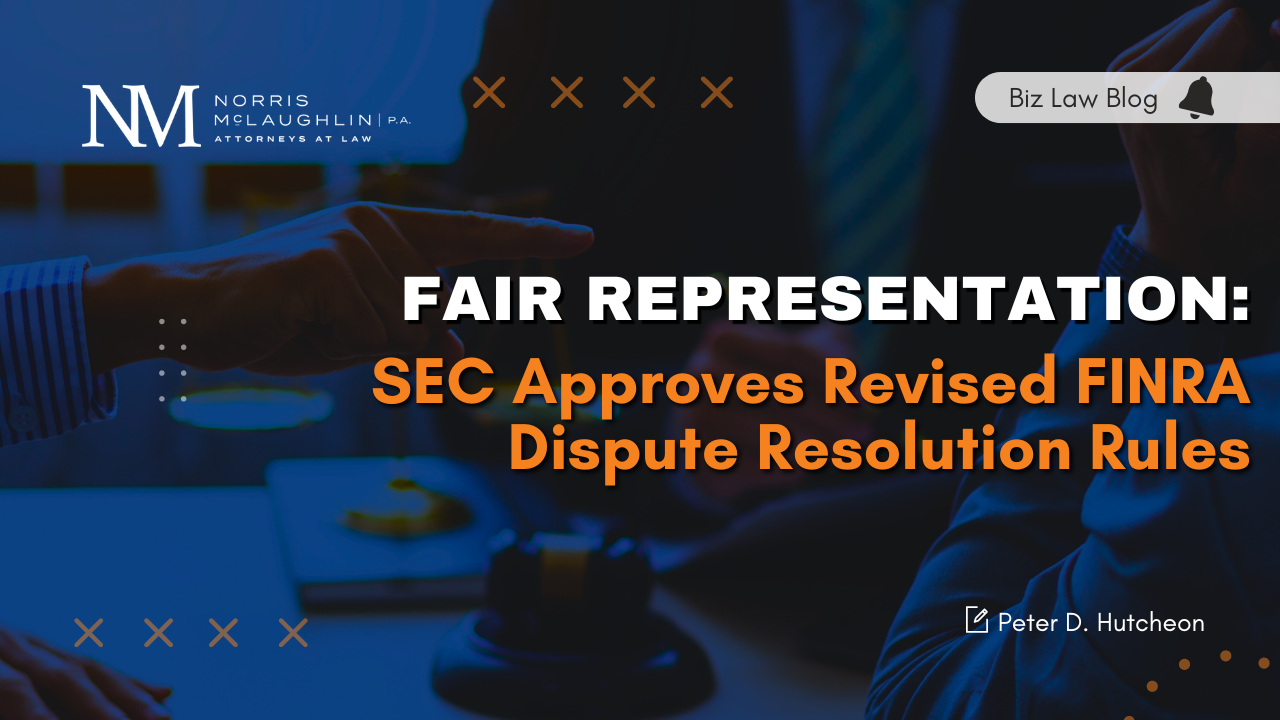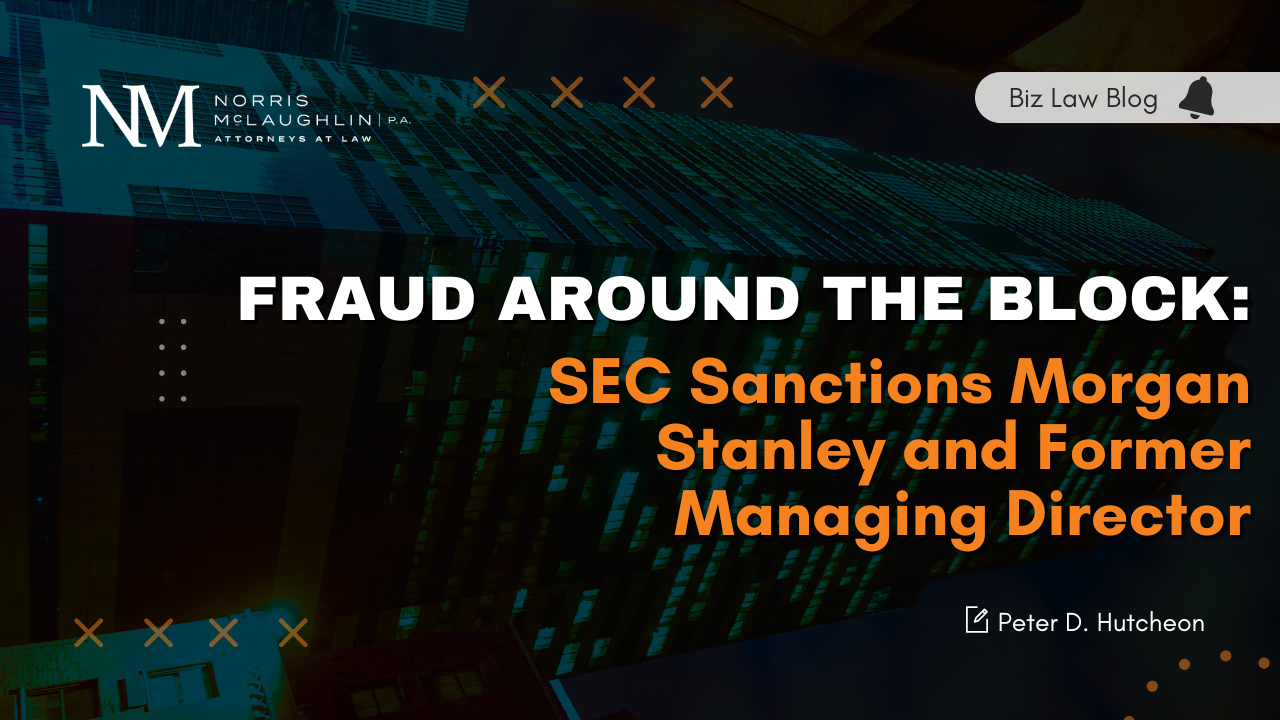Beware the Ides of March: SEC Requests Comments on Climate Disclosure

On Monday, March 15, 2021, the Acting Chair of the U.S. Securities and Exchange Commission (“SEC”), Allison Herren-Lee, pronounced in a Public Statement that “[i]n light of demand for climate change information and questions about whether current disclosures adequately inform investors, public input is requested from investors, registrants, and other market participants on climate change disclosure.” The Wall Street Journal for Tuesday, March 23, 2021, on page B 10, has a lengthy article, “EU Rules Challenge U.S. Funds,” about the impact on U. S. investment fund managers of the European Union’s new Sustainable Finance Disclosure Regulation. The Journal notes that “[i]n the U.S. the Biden Administration is taking the first tentative steps toward imposing similar rules requiring disclosure of harm investments could do to the environment and society,” and cites the SEC initiative requesting public input.
Climate Change Risk
Acting Chair Herren-Lee, in her March 15 Public Statement, asserts that since 2010 (when the SEC issued its first guidance to public companies as to how to address climate change risk disclosures) “investor DEMAND [emphasis added] for … climate change risks, impacts, and opportunities has grown dramatically,” citing several investor and business groups, as well as the SEC itself and other regulators. She notes that the SEC Asset Management Advisory Committee in 2020 recommended that the Commission adopt standards “by which corporate issuers disclose material ESG risks.” So she has requested the SEC staff to “evaluate …[SEC] disclosure rules with an eye toward facilitating the disclosure of consistent, comparable, and reliable information on climate change.”
As part of the most recent meeting of the Asset Management Advisory Committee on Friday, March 19, 2021, SEC Commissioner Roisman urged a careful and incremental approach to climate change disclosure, noting that climate change and related topics can be “polarizing.” He also expressed concern about the scope of the SEC’s jurisdiction and whether increased climate change disclosure requirements will in fact benefit the capital markets. He raises technical issues about the design and effectiveness of such increased disclosure, not the least of which is who or what is to set the standards for such disclosure. What he does not say, but what almost certainly lurks below the substance of his speech, is a recognition of the uncertainty of the science, i.e., of the factors “causing” climate change and the probability of bias in the regulatory approach, where if a business carries on certain activities, it is “harming” the environment, with no netting out of the economic or other goods that may flow from those activities.
On the same day, Commissioner Hester Peirce noted that “to arrive at broad ESG disclosure mandates…, we have to reimagine materiality. But reimagining materiality is the same as tossing it in favor of a more malleable new edition. Materiality has served us well, and undermining it to accommodate ESG will harm investors.” She then urged the Asset Management Advisory Committee “to rethink the wisdom recommending that we embark on a program to write standards for a set of issues THAT NOBODY CAN DEFINE [emphasis added]. They are not akin to accounting standards, which serve a clear, time-tested, universally understood objective.” Commissioner Peirce asks that one recognize the uncertainty of the “science,” and act with appropriate caution. But those requests will probably not be followed.
SEC Requests Comments on Climate Disclosure
As part of the March 15 Public Statement, Acting Chair Herren-Lee poses 15 questions for consideration:
- How can the SEC best “regulate, monitor, review, and guide climate change disclosures?” “Where and how should such disclosures be provided?”
- What information on climate risks “can be quantified and measured?” How is that information used by the capital markets? Should disclosures be tiered or phased in over time? Does this information affect the cost of capital? What is the impact of “robust carbon markets” on the assessment of risks and costs?
- What is the utility of LETTING [emphasis added] investors, registrants, and other industry participants develop voluntary disclosure standards? Should the SEC establish minimum disclosure standards?
- Should the standards be tailored to specific industries and, if so, how should those standards be developed?
- Should SEC disclosure rules incorporate the framework created by the Task Force on Climate-Related Disclosures, the Sustainability Accounting Standards Board, or the Climate Disclosure Standards Board? [See footnote below concerning these bodies].
- How should any new SEC disclosure requirements be “updated, improved, augmented, or otherwise changed over time?” Should that be done by the Commission or by a third-party standards setter and, if the latter, which third-party?
- Should climate disclosure be part of Regulation S-K [business description information] or S-X [financial disclosure]; or should there be a new stand-alone regulation?
- How should internal governance concerned with climate change be disclosed? What about disclosure of how executive compensation is related to climate change risk?
- Should there be global standard-setting standards about which public companies must make a disclosure?
- Should there be a climate disclosure compliance audit requirement? And if a registrant is found wanting, who should enforce any penalties and what should they be?
- How should the Commission ensure the reliability of such disclosure? Should it be part of management’s annual certification concerning internal controls, perhaps requiring a sign-off by the CEO and CFO?
- Is a “comply or explain why not” regime is acceptable?
- Should the Management’s Discussion and Analysis of Financial Conditions and Results of Operations have a new climate change disclosure requirement?
- What should the SEC do, and how should it deal with public companies, about privately-held companies, not subject to the jurisdiction of the SEC? Should the SEC impose disclosure requirements as a condition to qualifying to conduct exempt offerings and/or as part of the Commission’s oversight of investment advisers and/or funds?
- Should climate-related disclosure be part of broader required ESG disclosure, even if those other issues do not involve the same financial risks as climate change?
The structure of the questions discloses their institutional bias. The Acting Chair assumes that new regulations are required; there is no question as to whether new disclosure regulations are necessary or what costs and detriments would be involved in complying. The reference in Question 2 to “robust carbon markets” discloses the regulatory mindset, at least for the Acting Chair. In some ways, it would be tempting to ignore the March 15 Public Statement for “public input,” but that is a “fool’s errand.” Some regulatory initiative is coming, much as the March 23 Wall Street Journal article projects. Hence, every public company, all broker/dealers, and every registered investment adviser must consider the potential implications of new SEC disclosure requirements concerning climate change.
Beware the Ides of March
In the simultaneously hopeful and yet unstoppable words of the great Scottish Bard Robert Burns in “A Man’s a Man for A’ That:”
For a’ that, an’ a’ that, It’s coming yet for a’ that.
As lawyers representing businesses both public and private, we are well-acquainted with both disclosure regulations and environmental concerns, and the costs involved in complying with them. Should you think it helpful, we might be able to assist you in responding to the SEC’s request for “public input” on this regulatory initiative.
If you have any questions about this post or any other related securities or general business law matters, please feel free to contact me at pdhutcheon@norris-law.com.
Footnote: The Task Force on Climate-Related Financial Disclosure was established in 2015 by the Financial Stability Board (which was established in 2009 in the wake of the Great Recession by the Bank for International Settlements (“BIS”) in Basel, Switzerland. It has 31 members chosen from all of the G-20 countries and is hosted and funded by the BIS. The Sustainability Accounting Standards Board was founded in 2011 by private parties to parallel the Financial Accounting Standards Board and focuses on material financial issues implicated by climate, etc. The Climate Disclosure Standards Board is a private association of businesses and professionals organized in the United Kingdom in 2009 and updated in 2018, so its reporting framework aligns with the International Financial Reporting Standards.




